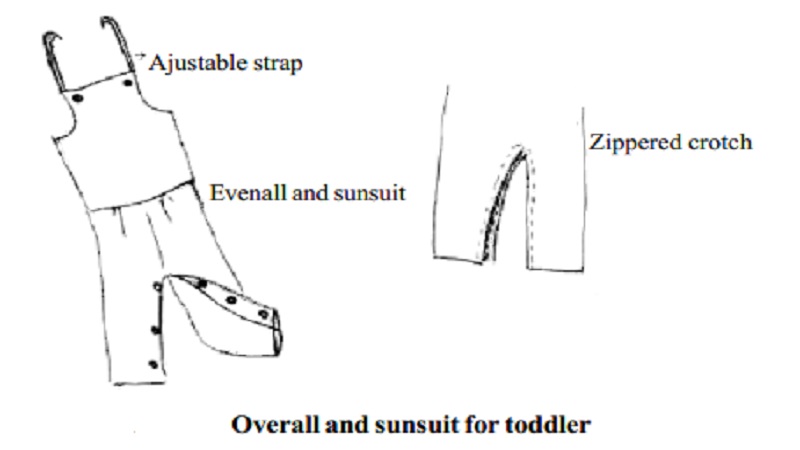Chapter: 11th 12th std standard Textiles And Dress Designing Cloth stitch Higher secondary school College practical steps methods Notes
Selection of Dresses : Clothing for Infant (up to 9 months), Creeper (9 months to 1 year), the Toddler (1-2 years)

Clothing for the Infant (up to 9 months)
The three 'musts' in clothing the newborn baby are warmth, comfort, and hygienic qualities. The amount and type of clothing which the infant will need will be determined to some extent by the time of the year, general climatic conditions, warmth of child's room and condition of the infant. The most suitable fiber for infant's clothing is cotton, because it is soft, and can be kept hygienically safe by washing in hot or boiling water.
Key points for selection of infant's clothing
Infant's clothes should be selected primarily on the basis of comfort and ease of care. Garments which need no ironing, easy to put on the baby, and have no hard or rough surface to cause discomfort are considered most suitable.
Baby clothes should be soft, pliable and not irritating.
They should provide ventilation to allow any moisture to evaporate. Inadequate ventilation causes moisture to stay next to baby's sensitive skin and may result in skin irritations.
Clothing should be simple and well made. Fancy trimmings require extra care in laundering and often irritate the baby.
Knit fabric garments stretch with body movements and are easy to put on the infant.
Openings all the way down the front or back make dressing simpler.
Ties or flat fasteners are more comfortable; drawstring necklines are not recommended because the infant might become caught in the strings.
If ties or buttons are used, they should be inspected often to make sure that they are sewed securely.
The rate of physical growth is very rapid. Extra seam allowances and hems can be given.
Clothing for Creeper (9 months to 1 year)
After the baby has began to creep about, more clothes are required, partly for safety's sake. Overalls are the simplest form of garment for both sexes especially those with snaps in the crotch help easy change of diaper. Overalls shield tender knees from floor.
Reinforcement in the knees of pant legs will provide for greater durability.
Snapper or gripers on the crotch of overall save time when diaper changes are necessary.
Garments of firmly woven or knitted fabrics with appropriate seam finishes will give good service for rough wear and many launderings.
In cold weather zones a snowsuit, mittens, and hood will be necessary. A lightweight wind resistant, and washable fabric such as nylon or polyester is desirable.
During the creeping ages soft-soled shoes may be worn if protection from cold is needed. Shoes are about � inch longer than the toe, and stocking should be � inch longer than the foot.
Training pants are often worn when toilet training begins. (Fig). Training pants will continue to be worn until toilet training is accomplished. These pants are made of two-way stretch fabrics, which fit snugly at the hip. Centre panel of two, three, and four layers provide for absorption and protection. Training pants of knit fabrics are desirable, since they will give ease as the child moves about, and the stretch inherent in the fabric will allow for some degree of growth.
Creepers are physically more active than newborn baby. Their clothes should be able to absorb sweat due to the child's activities. Strong and durable fabrics are suitable for this age group. They crawl on the floor, fabrics from knees wear off due to friction. But strong and durable fabrics can withstand the friction. Reinforcement can be given at knees with the help of a patch.
Garments with adjustable straps are more suitable due to growing stage.
Clothing for the Toddler (1-2 years)
The toddler needs clothing that provides maximum freedom for all the activities usual at this stage.
Again, overalls are preferred, especially if they have wide shoulder straps that are long enough for adjustments as the child grows.
Toddlers commonly wear one-piece garments with zipper openings at the legs or crotch.
One-piece pyjamas are usually safer and neater than two-piece ones. Pyjamas should be made of soft, washable material.
Related Topics